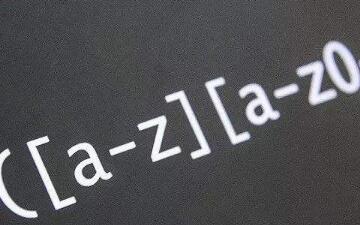正则表达式或“regex”用于匹配字符串的各个部分 下面是我创建正则表达式的备忘单。
匹配正则
使用 .test() 方法
let testString = "My test string";
let testRegex = /string/;
testRegex.test(testString);匹配多个模式
使用操作符号 |
const regex = /yes|no|maybe/; 忽略大小写
使用i标志表示忽略大小写
const caseInsensitiveRegex = /ignore case/i;
const testString = 'We use the i flag to iGnOrE CasE';
caseInsensitiveRegex.test(testString); // true提取变量的第一个匹配项
使用 .match() 方法
const match = "Hello World!".match(/hello/i); // "Hello"提取数组中的所有匹配项
使用 g 标志
const testString = "Repeat repeat rePeAT";
const regexWithAllMatches = /Repeat/gi;
testString.match(regexWithAllMatches); // ["Repeat", "repeat", "rePeAT"]
匹配任意字符
使用通配符. 作为任何字符的占位符
// To match "cat", "BAT", "fAT", "mat"
const regexWithWildcard = /.at/gi;
const testString = "cat BAT cupcake fAT mat dog";
const allMatchingWords = testString.match(regexWithWildcard); // ["cat", "BAT", "fAT", "mat"]
用多种可能性匹配单个字符
- 使用字符类,你可以使用它来定义要匹配的一组字符
- 把它们放在方括号里 []
//匹配 "cat" "fat" and "mat" 但不匹配 "bat"
const regexWithCharClass = /[cfm]at/g;
const testString = "cat fat bat mat";
const allMatchingWords = testString.match(regexWithCharClass); // ["cat", "fat", "mat"] 匹配字母表中的字母
使用字符集内的范围 [a-z]
const regexWidthCharRange = /[a-e]at/;
const regexWithCharRange = /[a-e]at/;
const catString = "cat";
const batString = "bat";
const fatString = "fat";
regexWithCharRange.test(catString); // true
regexWithCharRange.test(batString); // true
regexWithCharRange.test(fatString); // false
匹配特定的数字和字母
你还可以使用连字符来匹配数字
const regexWithLetterAndNumberRange = /[a-z0-9]/ig;
const testString = "Emma19382";
testString.match(regexWithLetterAndNumberRange) // true
匹配单个未知字符
要匹配您不想拥有的一组字符,使用否定字符集 ^
const allCharsNotVowels = /[^aeiou]/gi;
const allCharsNotVowelsOrNumbers = /[^aeiou0-9]/gi; 匹配一行中出现一次或多次的字符
使用 + 标志
const oneOrMoreAsRegex = /a+/gi;
const oneOrMoreSsRegex = /s+/gi;
const cityInFlorida = "Tallahassee";
cityInFlorida.match(oneOrMoreAsRegex); // ['a', 'a', 'a'];
cityInFlorida.match(oneOrMoreSsRegex); // ['ss'];
匹配连续出现零次或多次的字符
使用星号 *
const zeroOrMoreOsRegex = /hi*/gi;
const normalHi = "hi";
const happyHi = "hiiiiii";
const twoHis = "hiihii";
const bye = "bye";
normalHi.match(zeroOrMoreOsRegex); // ["hi"]
happyHi.match(zeroOrMoreOsRegex); // ["hiiiiii"]
twoHis.match(zeroOrMoreOsRegex); // ["hii", "hii"]
bye.match(zeroOrMoreOsRegex); // null
惰性匹配
- 字符串中与给定要求匹配的最小部分
- 默认情况下,正则表达式是贪婪的(匹配满足给定要求的字符串的最长部分)
使用 ? 阻止贪婪模式(惰性匹配 )
const testString = "catastrophe";
const greedyRexex = /c[a-z]*t/gi;
const lazyRegex = /c[a-z]*?t/gi;
testString.match(greedyRexex); // ["catast"]
testString.match(lazyRegex); // ["cat"] 匹配起始字符串模式
要测试字符串开头的字符匹配,请使用插入符号^,但要放大开头,不要放到字符集中
const emmaAtFrontOfString = "Emma likes cats a lot.";
const emmaNotAtFrontOfString = "The cats Emma likes are fluffy.";
const startingStringRegex = /^Emma/;
startingStringRegex.test(emmaAtFrontOfString); // true
startingStringRegex.test(emmaNotAtFrontOfString); // false
匹配结束字符串模式
使用 $ 来判断字符串是否是以规定的字符结尾
const emmaAtBackOfString = "The cats do not like Emma";
const emmaNotAtBackOfString = "Emma loves the cats";
const startingStringRegex = /Emma$/;
startingStringRegex.test(emmaAtBackOfString); // true
startingStringRegex.test(emmaNotAtBackOfString); // false
匹配所有字母和数字
使用\word 简写
const longHand = /[A-Za-z0-9_]+/;
const shortHand = /\w+/;
const numbers = "42";
const myFavoriteColor = "magenta";
longHand.test(numbers); // true
shortHand.test(numbers); // true
longHand.test(myFavoriteColor); // true
shortHand.test(myFavoriteColor); // true
除了字母和数字,其他的都要匹配
用\W 表示 \w 的反义
const noAlphaNumericCharRegex = /\W/gi;
const weirdCharacters = "!_$!!";
const alphaNumericCharacters = "ab283AD";
noAlphaNumericCharRegex.test(weirdCharacters); // true
noAlphaNumericCharRegex.test(alphaNumericCharacters); // false
匹配所有数字
你可以使用字符集[0-9],或者使用简写 \d
const digitsRegex = /\d/g;
const stringWithDigits = "My cat eats $20.00 worth of food a week.";
stringWithDigits.match(digitsRegex); // ["2", "0", "0", "0"]
匹配所有非数字
用\D 表示 \d 的反义
const nonDigitsRegex = /\D/g;
const stringWithLetters = "101 degrees";
stringWithLetters.match(nonDigitsRegex); // [" ", "d", "e", "g", "r", "e", "e", "s"]
匹配空格
使用 \s 来匹配空格和回车符
const sentenceWithWhitespace = "I like cats!"
var spaceRegex = /\s/g;
whiteSpace.match(sentenceWithWhitespace); // [" ", " "]
匹配非空格
用\S 表示 \s 的反义
const sentenceWithWhitespace = "C a t"
const nonWhiteSpaceRegex = /\S/g;
sentenceWithWhitespace.match(nonWhiteSpaceRegex); // ["C", "a", "t"]
匹配的字符数
你可以使用 {下界,上界} 指定一行中的特定字符数
const regularHi = "hi";
const mediocreHi = "hiii";
const superExcitedHey = "heeeeyyyyy!!!";
const excitedRegex = /hi{1,4}/;
excitedRegex.test(regularHi); // true
excitedRegex.test(mediocreHi); // true
excitedRegex.test(superExcitedHey); //false
匹配最低个数的字符数
使用{下界, }定义最少数量的字符要求,下面示例表示字母 i 至少要出现2次
const regularHi = "hi";
const mediocreHi = "hiii";
const superExcitedHey = "heeeeyyyyy!!!";
const excitedRegex = /hi{2,}/;
excitedRegex.test(regularHi); // false
excitedRegex.test(mediocreHi); // true
excitedRegex.test(superExcitedHey); //false
匹配精确的字符数
使用{requiredCount}指定字符要求的确切数量
const regularHi = "hi";
const bestHi = "hii";
const mediocreHi = "hiii";
const excitedRegex = /hi{2}/;
excitedRegex.test(regularHi); // false
excitedRegex.test(bestHi); // true
excitedRegex.test(mediocreHi); //false
匹配0次或1次
使用 ? 匹配字符 0 次或1次
const britishSpelling = "colour";
const americanSpelling = "Color";
const languageRegex = /colou?r/i;
languageRegex.test(britishSpelling); // true
languageRegex.test(americanSpelling); // true
代码部署后可能存在的BUG没法实时知道,事后为了解决这些BUG,花了大量的时间进行log 调试,这边顺便给大家推荐一个好用的BUG监控工具 Fundebug。
原文:JS常用正则表达式备忘录
作者:前端小智
本文内容仅供个人学习/研究/参考使用,不构成任何决策建议或专业指导。分享/转载时请标明原文来源,同时请勿将内容用于商业售卖、虚假宣传等非学习用途哦~感谢您的理解与支持!

javascript较全常用的表达正则验证,js中采用test()方法
正则表达式是一种字符串匹配的模式(pattern),可以用来检查一个串是否含有某种子串、将匹配的子串替换或者从某个串中取出符合某个条件的子串等。本文整理了JS较全且实用正则表达式。

js使用正则过滤emoji表情符号
手机端常常会遇到用户输入框,输入emoji,如果是数据库是UTF8,会遇到报错,原因是:UTF-8编码有可能是两个、三个、四个字节。Emoji表情是4个字节,而Mysql的utf8编码最多3个字节,所以数据插不进去。
一次记住js的6个正则方法
来记忆一些常用特殊字符,这个是正则本身的范畴了,是不是总觉得记不住?其实我也记不住,每次都是去搜索和online验证来完成一些任务。我也困恼过,其实最后还是因为自己写的少吧,唯手熟尔。。。
密码强度的正则表达式(JavaScript)总结
本文给出了两个密码强度的正则表达式方案,一个简单,一个更复杂和安全。并分别给出了两个方案的解析和测试程序。一般大家可以根据自己的项目的实际需要,自行定义自己的密码正则约定。

JavaScript判断字符串包含中文字符的方法总结
JS中判断一个字符串是否包含汉字,下面就介绍2中常用的实现方法:用正则表达式判断、用 Unicode 字符范围判断。

js常用正则表达式验证大全(整理详细且实用)
正则表达式对象用来规范一个规范的表达式,本文讲的是JS正则表达式大全(整理详细且实用),包括校验数字、字符、一些特殊的需求等等
javascript 正则表达式之分组与前瞻匹配详解
本文主要讲解javascript 的正则表达式中的分组匹配与前瞻匹配的,需要对正则的有基本认识。分组匹配:捕获性分组匹配、非捕获性分组匹配。前瞻匹配:正向前瞻匹配: (?=表达式) 后面一定要匹配有什么、反向前瞻匹配: (?!表达式) 后面一定不能要有什么
利用正则表达式去除所有html标签,只保留文字
后台将富文本编辑器中的内容返回到前端时如果带上了标签,这时就可以利用这种方法只保留文字。利用正则表达式去除所有html标签,只保留文字
正则表达式后行断言 • 探索 ES2018 和 ES2019
先后行断言(Lookaround Assertion)是正则表达式中的一个构造,明确了当前位置的前后字符序列,但没有其他副作用。当前 JavaScript 唯一支持的 Lookaround Assertion 是 先行断言,其匹配当前位置接下来的字符序列

循环下的正则匹配?说说正则中的lastIndex
正则有一个属性叫lastIndex,它表示正则下一次匹配时的起始位置。一般情况下我们是使用不到它的,但在正则中包含全局标志g时,正则的test和exec方法就会使用到它
内容以共享、参考、研究为目的,不存在任何商业目的。其版权属原作者所有,如有侵权或违规,请与小编联系!情况属实本人将予以删除!




